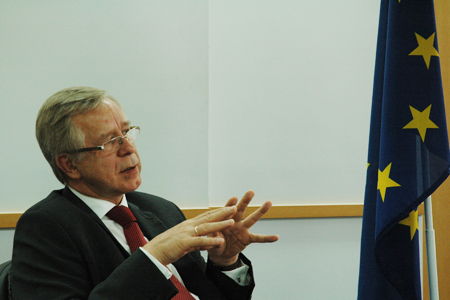EU invites Koreans to apply for unique scholarship
When Suh Sim-eun, a former research officer at the Global Green Growth Institute, studied environmental studies, her classrooms were scattered across Europe: Germany, Spain, the United Kingdom and Denmark. When not working, she made time to study Spanish or crossed a border into another country for the weekend.
“Mobility was so convenient, and I liked that part a lot,” Suh, who spent two years between 2007 and 2009 on the Erasmus Mundus program, told The Korea Times over the phone Thursday.
Ryu Chang-gi, a Korea Times intern, said the six months he spent in Lithuania in 2008 was one of the happiest periods of his life.
“By all means, it’s cultural diversity,” Ryu said as to what he remembers the most about the program.
Suh and Ryu are among roughly 100 Korean participants of the Erasmus Mundus program, a scholarship financed by the European
Union launched in 2004.
It is a global version of Erasmus, a 25-year-old program hailed as a success story of European integration in higher education. Erasmus is named after a 16th century Dutch scholar, but also stands for “European Region Action Scheme for the Mobility of University Students.”
“Through this program, the human resources and the international cooperation capacity of higher education institutions in both EU and non-EU countries can be developed by increasing mobility between the two,” European Union Ambassador to Korea Tomasz Kozlowski told The Korea Times during an interview on Aug. 17.
The Erasmus Mundus program is composed of two parts.
Action 1 is a degree program open for those who pursue master and doctorate degrees. Applicants must select a major out of a list of 150, and directly apply for it to a university.
Five Korean universities are participating as partners or associates.
(http://eacea.ec.europa.eu/erasmus_mundus/funding/scholarships_students_academics en.php)
Action 2 is designed to increase mobility between universities and institutes that participate in a consortium, covering expenses for short-term exchanges of researchers or staff.
Four Korean universities are partners in two partnerships.
(http://eacea.ec.europa.eu/erasmus_mundus/results_compendia/selected_projects_en.php)
The strongest feature of Erasmus Mundus is finance.
“The program has enabled millions of Europeans — and non-Europeans now — to study abroad with a limited impact on their budget. It has brought revolution inside the higher education market,” the ambassador said.
The program doesn’t have a national quota.
Since it was launched in 2004, more than 15,000 people from all over the world have benefited from the scheme, and the interest continues to grow.
But the picture in Korea is different.
“Korean participation is proportionally very small,” Kozlowksi said, citing lack of awareness as a cause.
For the 2011-2012 program, 64 students from Korea have applied, whereas 2,306 from India and 2,133 from China.
To overcome this, his office and affiliated organizations in Korea work in collaboration.
Since 2008, a Study-in-Europe Fair and Erasmus Mundus seminars have toured around the country every year. “Next Year, we’re going to have a bigger promotion.”
Another challenge is non-transferable credits. The ambassador himself tries to raise the issue when he meets the Korean authorities or university representatives, hoping for change.
“In Europe, we have a system of mutual credits. But, under this partnership, not all universities seem to be ready to recognize credits,” the ambassador said.
“If students go to Europe for one semester or one year, they expects their credits to be recognized later on. We have to work more to establish some kind of system for this.”
A strong penchant for the United States as a destination for higher education is another reason for the low numbers of participating Koreans.
For several years, Korean students were a considerable proportion of the international student body attending U.S. universities.
The ambassador did not make a comment, but Suh said she was often asked why she chose to study in the EU instead of the U.S.
Erasmus Mundus is waiting for a huge expansion in a couple of years.
The European Commission has proposed a budget increase for the entire program — covering both pan-Europeans and non-Europeans — to 19 billion euro, a 73 percent increase compared to current spending. If approved by the European parliament and 27 member states, the new “Erasmus for All” program will cover mobility of 5 million between 2014 and 2020.
Asked whether the current debt crisis could obstruct approval of the budget increase, the ambassador said, “The EU has some economic problems. But, according to the current way of thinking in Europe, education, research, technology and innovation are priorities.”
For general information about the Erasmus Mundus program and study in Europe, visit http://eacea.ec.europa.eu/erasmus_munsua, or http://ec.europa.eu/education/study-in-europe. <The Korea Times/Kim Se-jeong>

























































